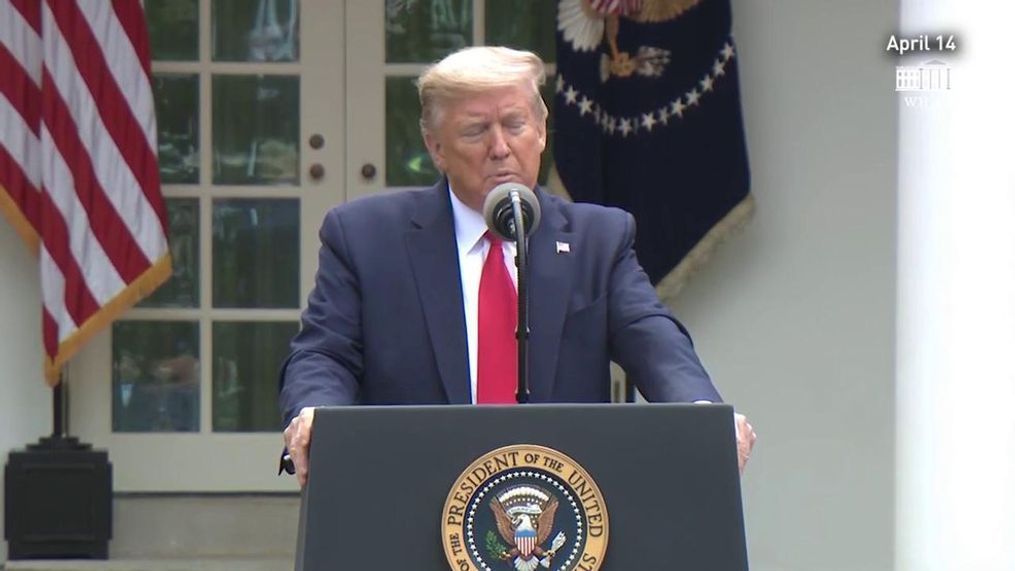A 'net loss': Will the #coronavirus reshape China's relations with the world?

WASHINGTON (SBG) — Amid criticism from congressional opponents, mainstream news media, and foreign leaders, senior White House officials defended President Trump's decision to suspend U.S. funding for the World Health Organization, arguing the agency failed in its core mission during the coronavirus outbreak.
"We the American people, the taxpayers who foot the bill for WHO at the tune of $830 million-plus over the last two years," said White House Counselor Kellyanne Conway in a session with reporters Wednesday morning, "should expect a return on that investment, that the WHO tells us the truth about this virus: its origins, whether it can be transmitted human to human. They denied that....Let's at least hit pause and investigate that. Nobody is scapegoating them; we're asking them why they didn't do their job."
VIDEO: When Xi Jinping walked the streets of Wuhan
The suspension of U.S. funding to the United Nations agency charged with improving global health outcomes -- at a time when New York City is believed to be experiencing the apex of virus-related hospitalizations and deaths -- drew sharp criticism from various quarters.
House Speaker Nancy Pelosi (D-CA) suggested that Mr. Trump was seeking to deflect blame for his own handling of the outbreak. "The truth is," the speaker tweeted on Tuesday, "that Donald Trump dismantled the infrastructure handed to him which was meant to plan for and overcome a pandemic, resulting in unnecessary deaths and economic disaster."
Helen Clark, a former prime minister of New Zealand whose career also included administration of U.N. development programs, told the RZN network: "I can't think of anything more foolish, in the middle of a global pandemic -- which has gone from being a health crisis to a full-blown economic and social crisis -- than taking away money from the World Health Organization, which is so critical in the fight against the health aspects."
But former Secretary of State Condoleezza Rice, who served under President George W. Bush, voiced support for President Trump's action. "We need to take a look at whether the World Health Organization has been politicized," Rice said Tuesday in a Skype video from the Hoover Institution, where she is now director. "It hasn't responded particularly well. It seemed to accept initially the Chinese argument that there was no human to human transmission with this disease."
VIDEO: A report that U.S. taxpayers sent $3.7 million to a Wuhan lab to study bats
In announcing the funding halt on Tuesday, Mr. Trump accused the WHO of being "China-centric, meaning,whatever it is, China was always right." Indirectly, the prospect of the agency losing such a large share of its estimated $2 billion annual budget marked the first substantive measure by the Trump administration -- but likely not the last -- to impose consequences on the Chinese government for initially withholding data about the spread of coronavirus within its borders.
And scholars of Chinese history acknowledged that the pandemic has imposed such staggering costs around the globe, in both human and financial terms, that the crisis will mark a milestone in China's relations with the rest of the world, which have been marked for centuries by a slow opening of the Middle Kingdom to Western commerce and influence. It was not until 1972, 196 years into the history of the United States, that President Nixon became the first U.S. president to visit China
"For the first time in living memory, the cost of engagement with China has now turned into a net loss, a significant net loss," said Justin M. Jacobs, an American University history professor whose latest book,The Compensations of Plunder: How China Lost Its Treasures, will be published in July. "Everyone wants cheap manufactured goods without the threat of a factory strike...with firm managerial control. And now, you're seeing for the first time that those economic benefits are being called into question.
"I do think it's going to force a reckoning," Jacobs added. "Different countries are going to have to ask themselves: Is this relationship worth trying to save? Or how does it need to change going forward?"
Other analysts have suggested that the size and value of the Chinese market to Western business firms -- worth an estimated $7 billion annually in U.S. foreign investment -- will overcome the distrust and fear engendered by the Chinese government's initial response to the outbreak.
"I think we're going to have to find a way where we don't cut off our nose to spite our face," said Michael Green, a former National Security Council official in the Bush-Cheney White House who now serves assenior vice president for Asia and Japan Chair at the Center for Strategic and International Studies. "I don't think, in terms of hard power and soft power, we can say that this has shifted [momentum] to China, but it has definitely reinforced the increasing viscosity, the tension, the competition, that we were already seeing building between the U.S. and China."
